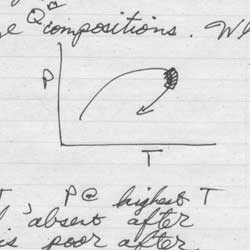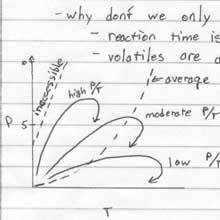 |
 |
My raw notes |
My copied-over notes (not from the same course) |
Dave's Tips for Student Success (especially in science courses)
You can't do well if you don't show up. Unless you're certain that you will fall asleep in class, you should show up. Furthermore, you should get enough sleep that you will not fall asleep in class!
Students who sit in the front couple of rows are more likely to pay attention, get eye contact with the instructor, and feel involved in the class. One easy thing to do to improve your classroom experience is to sit as close to the front as you can.
Do not expect to figure out what was going on from your notes. You must actively try to understand the material while you are in the classroom. You must actively try to gauge what parts of the material you do and do not understand. You should ask for a repetition of the parts that you don't understand, or you should ask a specific question about some part that you don't understand. It is only by building a conceptual structure in your mind that you can learn any complex subject.
The purpose of studying is (obviously) to learn the material. However, most students do not study effectively. You can think of the course material in two groups: (A) the material you do know; and (B) the material you do not know. Why waste time with (A)? A primary goal of studying should be to reveal to yourself what parts of the material you know (A) and what parts you do not know (B)!
The problem is that most studying methods do not help you do this very well. If you study by yourself, you are likely to gloss over the material that you don't understand very well, and think more about what you do understand, because that is the material that feels good to think about. If you are studying with a group, you have a somewhat better chance, but given that the difficult material is difficult for most students, you will all suffer from the same studying bias towards the known and away from the unknown. A friendly "going-around-the-table" discussing the material is nearly useless in my opinion.
My suggestion for dealing with this problem is to have confrontational study groups. In this setup, each person is assigned some portion of the material to master and to create sample questions for. These questions should be as difficult as possible, even tricky. Then you test each other. By doing this, you help each other to reveal the holes in your understanding (the B material).
This must be undertaken in a friendly manner, or you won't enjoy it enough to do it. The attitude of the question answerers (when they fail to answer a question correctly) should be that they are grateful for the help provided in revealing the holes in their knowledge. The attitude of the question maker should be that of one helping the others to gauge their knowledge.
The most useful technique I used in college was copying over my notes thoughtfully. Doing this correctly can be a way to reveal to yourself the holes in your knowledge, but it must be done with a particular mindset. The goal should be to produce a set of notes that are sufficient to re-teach you the material in ten years after you've forgotten most of it. Such a set of notes will be:
Organization is really the key virtue here. In order to have a well-organized set of notes, you must think about the material, asking yourself, "What are the most important parts of the material?" and "How do the different parts relate to each other?" If you do this, you should quickly find out what bits of the material do not make sense to you, and you can then use the text to remedy that lack of understanding, or, failing that, ask your instructor for help in understanding the material.
This copying over should be performed at least 2-3 times per week, and typically with the textbook at hand to clear up any confusion you have about the material. If you leave it all for the weekend, then you risk having forgotten material covered in lecture (but for which you may not have taken good notes), have missed out on the opportunity to ask about your misunderstandings at lecture, and you have given yourself a mountain of work.
One other advantage I found was this: knowing that you will be copying the notes over within about 48 hours, you are free to be as messy and disorganized as you wish, allowing much faster note-taking in class. This increases your ability to keep up with the instructor's lecture pace. See the example pages for what I'm taking about.
Once you have created a good set of notes, then studying should be much easier, since you have spent time learning the material as the term progressed, and best of all, you have a very neat and organized set of notes from which to study! I found that using this method doesn't increase your overall study time; it typically decreases it, but spreads it out over the term. Also, because you are learning as you go, instead of cramming the material at the end, you can learn more effectively (this is particularly important in science and math classes, in which later material builds upon, and requires mastery of, earlier material).
Study skills list of resources
I hope this is helpful.